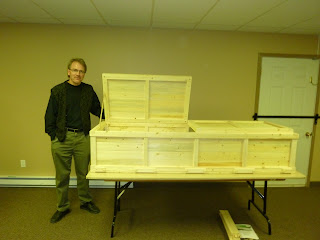I would like to report briefly on the November 16th public forum in Steinbach sponsored by the South Eastman Transition Initiative. Our speaker for the evening, Rick Zerbe Cornelson of Winnipeg, refers to himself as “The Village CasketMaker.” The bio-degradable casket he brought with him for display garnered a lot of attention from those who attended.
 |
Rick Zerbe Cornelson displays his “green” casket. |
Rick began by tracing the historical developments of the modern funeral system as we know it. He noted that a hundred years ago most funerals were “undertaken” by the immediate families of the deceased supported by local communities. Gradually local carpenters who built coffins began to offer their services to make funeral arrangements and so became known as “Undertakers.” After a few generations, these “professional” services became the standard way of undertaking funerals. Now, instead of being integrally involved, families simply pay for services rendered.
The first professional Funeral Home in Steinbach was owned by the Loewen family. By 2002, the chain of funeral homes Loewns had acquired was sold to its competitor for 1.2 billion dollars. Most funeral homes in North America today operate with the goal of maximizing profits. Our local Birchwood Funeral Chapel is an exception to the rule.
Because of this reality, as well as emerging concerns of about environmental footprints we leave behind, many people have begun to rethink funerals from the ground up.
In speaking about the values and themes that should drive our funeral culture, Rick suggested that we need a balance between hope and comfort on the one hand, and the reality of death on the other. A modern temptation is avoid the pain and loss that inevitably comes with death. In order to find a good balance he suggested we follow four principles: honesty, simplicity, community and freedom.
Honesty allows us to deal with the pain of death authentically. Simplicity exudes confidence about our place in the cycle of life and death while being environmentally friendly. Community involvement helps to reduce the distance between the deceased and those remaining behind. And freedom permits us to do funerals the way we think best, even while departing from standard practices.
Rick concluded his address by noting some emerging alternative practices related to funerals. These include re-involving children in funerals, keeping the body at home for a “wake,” funeral co-ops, cremation, natural burials, and using locally made products.
Following the key-note address, Gerry Dubé of La Broquerie made a short presentation about composting as an alternative to standard burials. While the thought seems abhorent to some, he noted, so did cremation a generation ago. He suggested that composting could give real meaning to the notion of returning to the ground from which we came, and composting would break down the toxins we have ingested during our lifetime that remain present in our body when we die.
All this input generated a lot of dialogue during the panel discussion that involved both speakers, as well as Todd Harder of Birchwood Funeral Chapel. It is fair to say that we have begun rethinking funerals here in the Southeast.
Jack Heppner
No comments:
Post a Comment